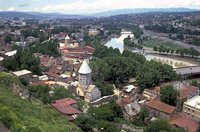Relations between Georgian-Armenians and the Georgian government have become considerably strained recently. Nearly a month ago a policeman in Javakh, for some reason, decided that if the motorcyclist doesn’t stop upon hearing the policeman’s demand, he must shoot him. The shot was fired and became fatal for a 30-year old father of two.
Nonsensical things were heard during the investigation, claiming that the Georgian policeman who had exceeded his authority did not know that he was shooting an Armenian. Question: Would he not shoot if he knew that the motorcyclist was Armenian? What if he was Georgian, Abkhaz, Ossetian, Jew, Russian…? What would happen? Wouldn’t his murder be considered misuse of authority?
Georgian deputy Beso Jugheli, elected by the majority electoral system, offended Armenians (and not only Armenians) when the Georgian parliamentarians decided to raise real estate taxes in the heart of Tbilisi in yet another attempt at taking money away from the people. According to the parliamentarians, the people who have lived in the old neighborhoods of Tbilisi, generation after generation, must pay a tax for living in such an old neighborhood, in addition to the tax they pay for their residencies. The tax is rather high – 3 lari for 1 square meter – which is the equivalent of 2 dollars. It is said that that money is going to be used to preserve the old appearance of the city, which foreign tourists love so much. As an example, the authors of the new law mention Dubrovik of Croatia. However, they “all forget” that the residents of ancient central Dubrovik are not the ones paying the additional tax, rather the brand name companies that have rented offices in that area. If the residents of the ancient neighborhoods of Sololak, Meydan and Tbilisi are not able to pay a certain amount of money, they will be forced to leave the homes constructed by their ancestors. It is a clever thought. First of all, most of the houses of that residential neighborhood need to be remodeled, and the government has decided how to do that without spending too much of the state budget’s money. Secondly, there are many non-Georgians living in those neighborhoods, including Armenians, Azerbaijani, Kurds and the Jews. This has always served as an occasion for biased judgments claiming that the Georgians didn’t build the capital city of Georgia. The moving of the residents to other neighborhoods (supposedly to the outskirts) will put an end to the debates about the indigenous Tbilisians.
Thus, Jugheli let the cat out of the bag by saying that it is not obligatory that a person live for centuries in, let’s say, Sololak. After a couple of days, in response to a question during his interview on “Imedi” radio station, he called on not observing the bill as anti-Georgian because there are mainly Armenians, Kurds and Azerbaijani residing in the ancient neighborhoods of Tbilisi. Interestingly, neither the deputy’s colleagues, nor representatives of the executive branch, nor the Georgian public responded to his call, but only the oppositional “Multi-national Georgia” party. The latter demanded that Jugheli publicly apologize. He in fact apologized, but he said it in a tone and in such a context that it would be better if he hadn’t apologized.
Finally, a couple of days ago the “United Javakh” organization dispersed an announcement, according to which the Georgian authorities were accused of leading a national discrimination policy and that it was their fault. The reason for the callous announcement made by the Armenians of Akhalkalak was the event that took place on April 24. On that day, after the commemoration event, there was a dispute between a member of the “United Javakhk” organization, by the name of Andranik Abelyan, and the driver of the local public prosecutor (according to some insiders, the driver was Georgian by nationality). Abelyan was supported by a member of the same organization and former mayor of Akhalkalak Nairi Iritsyan, and Arthur Poghosyan. The latter were arrested the same evening. Much later, Iritsyan was conditionally released, but Poghosyan was transferred to the interrogation cell of Tbilisi. In its announcement, “United Javakhk” qualified the event that took place as an intrigue and demanded the immediate release of Poghosyan, with the threat that the situation in Javakhk may turn unstable.
Accepting the seriousness of the situation and the errors of the authorities with respect to the national policy, politician Paata Zakareishvili excludes the possibility of serious sentiments in Javakhk.
“I am interested to know why they transferred Arthur Poghosyan to the isolation cell of Tbilisi. After all, that was what politicized the event. As far as the announcement that that could create an unstable situation is concerned, I must say that there have been similar announcements made in the past at a time when the Russia military bases were being dislocated, but fortunately, nothing happened. I don’t think that there will be any changes,” says Zakareishvili.
He is most probably right. In any case, we would like to believe him. However, let’s not forget that impatience grows slowly and not immediately, and the abovementioned three events probably added to the growth of that impatience…

